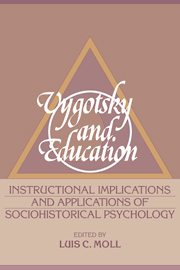Book contents
- Frontmatter
- Contents
- List of contributors
- Preface
- Acknowledgments
- Introduction
- Part I Historical and theoretical issues
- 1 Vygotsky: The man and his cause
- 2 The historical context of Vygotsky's work: A sociohistorical approach
- 3 Cognitive development and formal schooling: The evidence from cross-cultural research
- 4 The voice of rationality in a sociocultural approach to mind
- 5 The social origins of self-regulation
- 6 Vygotsky, the zone of proximal development, and peer collaboration: Implications for classroom practice
- Part II Educational implications
- Part III Instructional applications
- Name index
- Subject index
1 - Vygotsky: The man and his cause
Published online by Cambridge University Press: 05 June 2012
- Frontmatter
- Contents
- List of contributors
- Preface
- Acknowledgments
- Introduction
- Part I Historical and theoretical issues
- 1 Vygotsky: The man and his cause
- 2 The historical context of Vygotsky's work: A sociohistorical approach
- 3 Cognitive development and formal schooling: The evidence from cross-cultural research
- 4 The voice of rationality in a sociocultural approach to mind
- 5 The social origins of self-regulation
- 6 Vygotsky, the zone of proximal development, and peer collaboration: Implications for classroom practice
- Part II Educational implications
- Part III Instructional applications
- Name index
- Subject index
Summary
“Not everything that was must pass.” This line from a poem by Tyutchev that Lev Vygotsky loved to recite can also serve as a metaphor for Vygotsky himself. Although he died more than 50 years ago, Vygotsky left an impressive body of work that, as is the case with most geniuses, becomes more modern as time goes by. Vygotsky gave a new configuration to psychology's past, proposed theoretical alternatives to its present, and suggested solutions that became projects for the future. It is only now that the impact of his work is beginning to be felt in the scientific community. His theory is offering answers to questions that seemed insoluble and is setting a course for us to follow. Vygotsky, as Jerome Bruner (1987) has said, speaks to us from the future.
Vygotsky did not write his memoirs, and none of his contemporaries wrote them for him, and a war that destroyed half a continent buried many of his life's documents. He seemed condemned to have no biography; his history, therefore, must be reconstructed from fragments that form pieces of a puzzle. Those wanting to assemble this puzzle have two main sources available: those who knew him personally and the biographical sketches drawn by those with access to his work or to his collaborators. Among the former, the best sources are Semyon Dobkin, his childhood friend; Vygotsky's sisters; his colleague and follower Alexander Luria; his disciples Rosa Levina, Natalia Morozova, Piotr Galperin, and Bluma Zeigarnik; and his daughter Gita Vygodskaya.
- Type
- Chapter
- Information
- Vygotsky and EducationInstructional Implications and Applications of Sociohistorical Psychology, pp. 31 - 58Publisher: Cambridge University PressPrint publication year: 1990
- 25
- Cited by



